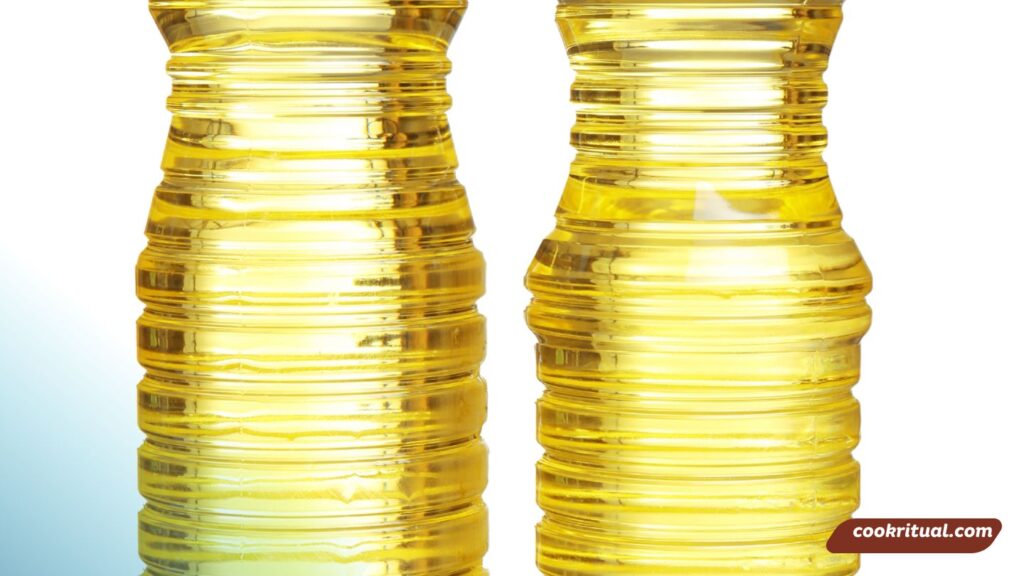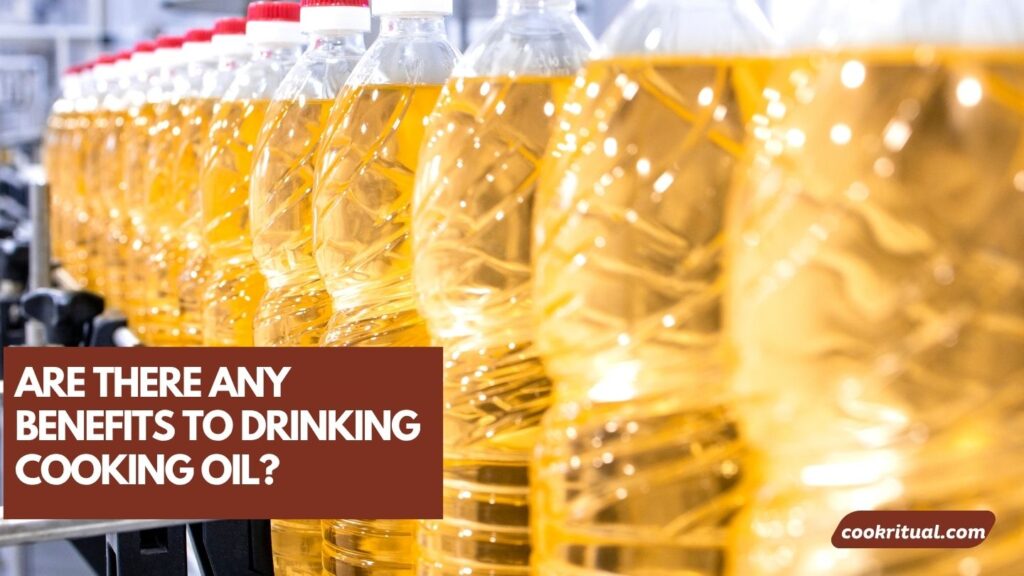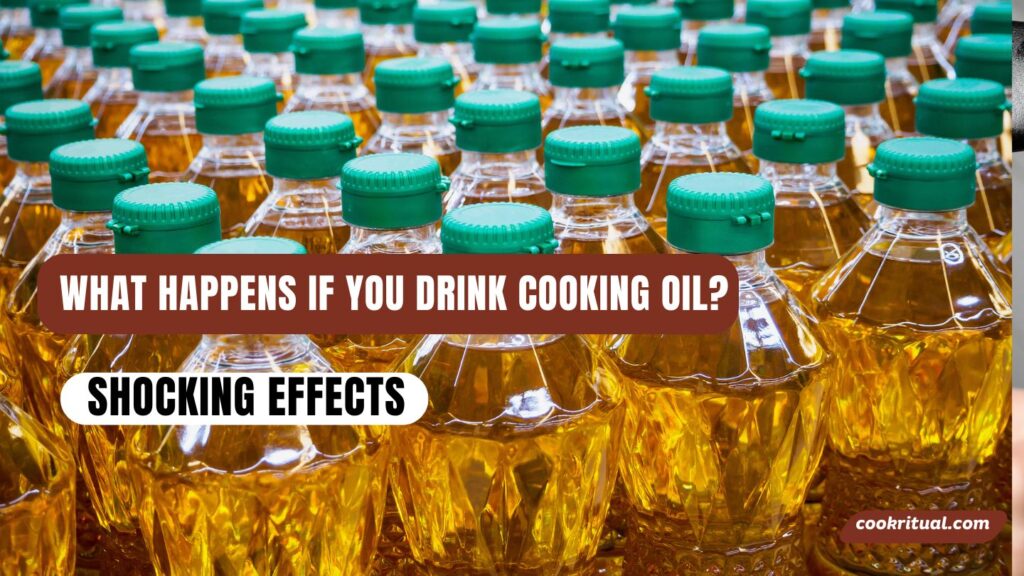Drinking cooking oil—even a small amount—can lead to digestive discomfort, health risks, and in some cases, long-term damage. It may sound like a bizarre question, but you’d be surprised how often it comes up—whether due to health fads, dietary experiments, or even accidental ingestion.
Some people believe that drinking certain oils like olive or coconut oil can offer digestive or skin health benefits. Others may confuse culinary oil use with medicinal oil practices, or worse, accidentally consume cooking oil thinking it’s safe in any form. But is this habit safe—or potentially harmful?
In this guide, we’re unpacking everything that happens if you drink cooking oil, including the immediate side effects, long-term consequences, possible health benefits (yes, there are a few exceptions!), and what to do in case of accidental ingestion. Whether you’re simply curious, following a trend, or trying to make informed health choices, this breakdown will offer clarity based on science, expert guidance, and real-life kitchen know-how.
Contents
- 1 Is It Safe to Drink Cooking Oil? Understanding the Basics
- 2 Immediate Effects of Drinking Cooking Oil
- 3 Long-Term Health Risks of Regular Oil Ingestion
- 4 Are There Any Benefits to Drinking Cooking Oil?
- 5 Differences Between Types of Cooking Oils and Their Effects When Ingested
- 6 What to Do If You or Someone Accidentally Drinks Cooking Oil
- 7 Expert Opinions and Medical Warnings
- 8 Healthy Alternatives to Drinking Cooking Oil
- 9 Common Questions About Drinking Cooking Oil (FAQs)
- 10 Final Thoughts and Actionable Recommendations
Is It Safe to Drink Cooking Oil? Understanding the Basics
Drinking cooking oil might seem harmless—after all, we cook with it daily. But that doesn’t mean it’s safe to drink it straight from the bottle. Oils like vegetable, canola, olive, and coconut oil are made for cooking, not sipping.
What’s in Cooking Oil?
Most cooking oils are made of fats. These include saturated, unsaturated, and sometimes trans fats. Some oils also contain additives to improve shelf life or flavor.
- Vegetable and canola oil are often refined and processed.
- Olive oil (especially extra virgin) is less processed and may offer some health benefits.
- Coconut oil is high in saturated fat.
When consumed in food, oils can help the body absorb vitamins and support brain function. But when we drink them, the body reacts differently.
Edible Oil vs. Non-Edible Oil
Not all oils are meant to be eaten. Some industrial oils look like cooking oil but can be toxic. Always check the label for food-grade certification.
According to the USDA, edible oils must meet safety standards before they hit grocery shelves.
If you’re ever unsure whether an oil is safe to consume, don’t risk it. Use it only as directed.
Immediate Effects of Drinking Cooking Oil

Drinking cooking oil can lead to quick reactions in the body, especially the stomach. Even a tablespoon might cause unwanted symptoms.
Digestive Reactions
Here’s what might happen within minutes to hours:
- Nausea
- Stomach cramps
- Diarrhea
- Bloating or gas
- A greasy taste in the mouth
These effects happen because oil is hard for the stomach to process when consumed alone. It slows digestion and can upset your natural gut balance.
In some cases, vomiting may occur—especially in people with sensitive stomachs or children.
Possible Allergic Reactions
Some people may react to certain oils, like peanut or soybean oil. Signs of an allergic reaction include:
- Itchy throat
- Swelling
- Trouble breathing
If these symptoms occur, seek emergency help. The Mayo Clinic warns that food allergies can become life-threatening fast.
Long-Term Health Risks of Regular Oil Ingestion
While a small accidental sip is unlikely to cause serious harm, drinking cooking oil often can lead to bigger problems.
Impact on the Heart and Cholesterol
Most cooking oils are high in fat. Some—like trans fats and excess saturated fats—can raise bad cholesterol (LDL) and lower good cholesterol (HDL). Over time, this may increase the risk of:
- Heart disease
- Stroke
- High blood pressure
According to Harvard Health, the type of fat matters. Unsaturated fats (like those in olive oil) are better, but they still need to be used in moderation.
Fatty Liver and Weight Gain
Drinking oil regularly can overwhelm the liver, leading to fat buildup known as non-alcoholic fatty liver disease (NAFLD). It also adds excess calories without nutrients, which may cause:
- Rapid weight gain
- Insulin resistance
- Blood sugar spikes
Table: Types of Cooking Oil and Long-Term Health Effects
| Oil Type | Fat Content | Health Risk When Drunk Regularly |
| Vegetable Oil | Polyunsaturated fats | Can cause weight gain, inflammation |
| Olive Oil | Monounsaturated fats | May raise HDL but adds calories if drunk daily |
| Coconut Oil | Saturated fats | Raises LDL cholesterol and increases heart disease risk |
| Canola Oil | Low saturated fat | Better option, but still not meant for direct drinking |
Remember, oils are best consumed in small amounts as part of a balanced meal, not as a drink. The body isn’t designed to handle straight fats in large quantities.
Are There Any Benefits to Drinking Cooking Oil?

Drinking cooking oil isn’t usually recommended. But in a few special cases, certain oils can support health when taken in small, safe amounts.
Possible Health Benefits
Some traditional and medical diets suggest using oils for health reasons. These include:
- Constipation relief – A small amount of olive oil or mineral oil may ease bowel movement
- Skin and hair support – Healthy fats may help hydrate skin from the inside
- Nutrient absorption – Fats help the body absorb vitamins A, D, E, and K
The Cleveland Clinic notes that unsaturated fats like those in olive oil can be good for heart health when used in moderation.
When It Might Be Safe
A teaspoon of high-quality extra virgin olive oil or MCT oil may be used in:
- The Mediterranean diet
- Intermittent fasting support
- Keto-based meal plans
Still, it’s best to add oil to food—like salads or smoothies—rather than drinking it alone. That way, digestion is easier, and you still get the benefits.
Differences Between Types of Cooking Oils and Their Effects When Ingested
Not all cooking oils affect the body the same way. Some are less processed and contain better fats. Others are highly refined and may lead to more harm than good.
Cold-Pressed vs. Refined Oils
- Cold-pressed oils are made without heat. They keep more nutrients and taste better.
- Refined oils go through high heat and chemicals. They lose many good nutrients but last longer on shelves.
When it comes to drinking, cold-pressed oils like extra virgin olive oil may offer more benefits and fewer risks. But they still shouldn’t be consumed in large amounts.
Comparison Table: Cooking Oils and Their Effects When Drunk
| Oil Type | Type of Fat | Cold-Pressed? | Common Use | Effect When Drunk |
| Olive Oil (Extra Virgin) | Monounsaturated fat | Yes | Salads, dressings | May help digestion in small amounts |
| Vegetable Oil | Polyunsaturated fat | No | Frying, baking | Can upset stomach; lacks nutrients |
| Coconut Oil | Saturated fat | Yes/No | Cooking, baking | Raises cholesterol; high in calories |
| Canola Oil | Low saturated fat | Mostly refined | Frying, general use | Neutral but lacks any benefit when drunk |
| MCT Oil | Medium-chain triglycerides | Yes | Smoothies, keto diets | May help energy levels in small doses |
To learn more about how different oils impact the body, check Harvard T.H. Chan School of Public Health.
What to Do If You or Someone Accidentally Drinks Cooking Oil
It happens more often than we think—especially with kids or older adults. So what should we do if someone drinks cooking oil by mistake?
First Aid Steps
- Stay calm.
- Check the label – Make sure it’s an edible cooking oil.
- Don’t induce vomiting. This can make things worse.
- Offer water or milk – It may dilute the oil and ease symptoms.
- Watch for signs like nausea, stomach cramps, or diarrhea.
If a child or senior drinks oil, or if someone drinks a large amount, it’s best to call Poison Control (1-800-222-1222) or visit your nearest emergency room.
The CDC reminds us that some non-edible oils, especially industrial ones, can be dangerous or even toxic.
When to Seek Emergency Help
- Trouble breathing
- Chest pain
- Severe vomiting or diarrhea
- Signs of allergic reaction (swelling, hives, difficulty swallowing)
In these cases, don’t wait. Get medical help right away.
Expert Opinions and Medical Warnings
Doctors, dietitians, and food safety experts agree: drinking cooking oil is not a healthy habit. While some oils have health benefits when used in meals, drinking them straight is risky.
What Doctors Say
Most health professionals recommend using oils in cooking, not as drinks. Drinking oil adds calories fast and can upset your stomach.
- The American Heart Association warns against high intake of saturated and trans fats, which are common in many cooking oils.
- Registered dietitians say the best way to use oil is with balanced meals—not on its own.
Medical Warnings
Long-term consumption of oil as a drink may lead to:
- Weight gain
- Heart problems
- Liver stress
- Nutrient imbalance
Important: Children, pregnant women, and people with chronic health conditions should never drink oil without a doctor’s advice.
Healthy Alternatives to Drinking Cooking Oil
If you’re looking for digestive help, energy boosts, or beauty support, there are safer and more effective options.
Safe Ways to Add Oil to Your Diet
- Mix olive oil into salads or steamed vegetables
- Add a small spoon of MCT oil to smoothies
- Use flaxseed or avocado oil in dressings or dips
These options let you enjoy the benefits without hurting your stomach.
Other Healthy Fat Sources
Looking for better options than sipping oil? Try these instead:
| Healthy Fat Source | Why It’s Better |
| Avocados | High in fiber and potassium |
| Nuts (almonds, walnuts) | Good fats, protein, and minerals |
| Seeds (chia, flax) | Great for omega-3s and easy to add to food |
| Fatty fish (salmon, tuna) | Rich in omega-3s, supports heart and brain health |
For more on healthy fats, check out this guide from Harvard Health Publishing.
Common Questions About Drinking Cooking Oil (FAQs)
Q: Is it okay to drink a tablespoon of olive oil a day?
A small amount (like a teaspoon to a tablespoon) may be safe for most people if it’s high-quality extra virgin olive oil. But always talk to a doctor first.
Q: What happens if a child drinks cooking oil?
Most cases result in an upset stomach, but you should still call Poison Control or a doctor, especially if symptoms appear.
Q: Can drinking oil help with constipation?
Yes, sometimes. A small amount of mineral oil or olive oil is used for relief, but it’s better to eat fiber-rich foods. Talk to a healthcare provider before trying this.
Q: Are there any oils safe to consume directly?
Some oils like MCT or flaxseed oil are marketed for direct use in small amounts. Even then, it’s best to mix them into food or drinks.
Final Thoughts and Actionable Recommendations
Drinking cooking oil may seem harmless, but it can cause real problems—both short and long term. While small amounts of certain oils can support health, drinking them straight isn’t the best approach.
Key Takeaways
- Cooking oils are meant to be eaten with food—not drunk by themselves.
- Some oils offer health benefits, but only in the right context.
- Always check labels and avoid non-edible or industrial oils.
- Call a doctor or Poison Control if someone drinks oil accidentally.
What You Can Do Instead
Use heart-healthy oils in meals—not as drinks
Choose whole food fats like nuts, seeds, and avocado
Stay hydrated and eat fiber for better digestion
Talk to a dietitian before trying oil as a health boost

